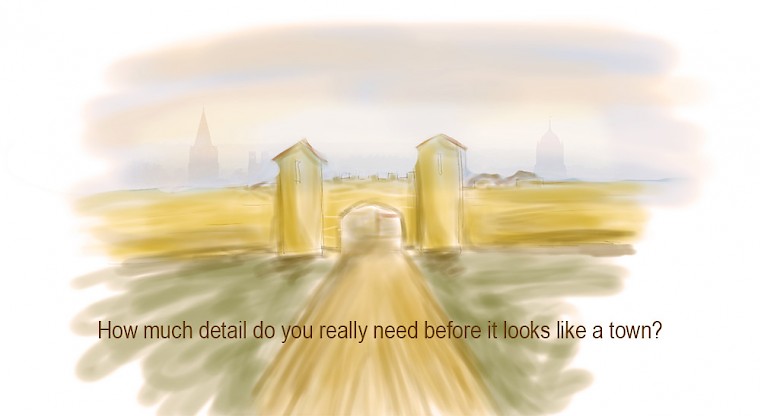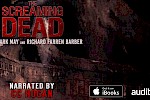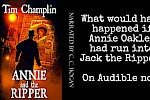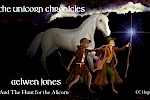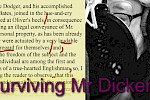Welcome to My Town! All the fun of the fair! Great markets, friendly taverns, warm inns - just ask your nearest guard for directions!
If you are writing a high fantasy, complete with its own land, the chances are that you are going to end up in a village, town or city at some point or other. How much detail you offer will depend on how long you plan to stay there, whether your characters are residents or just visiting and how important the location is to the plot. Give too much information and you take away the mystery and fun of discovering a new place, give too little and it might come across as unrealistic, or even implausible.
Fantasy, for me, comes in two main flavours; one is a surrealistic approach where everything is completely unfamiliar, illogical and somehow incredible, but the other is the world that is recognisable at some level and has additional fantastical elements attached. For instance, in my books called Dirt, the world is pre-medieval ish with dragons added for flavour. So, if I were to be able to physically transport my readers to Dirt, they might be annoyed at the lack of internet or any other modern technology, but they would recognise most of what they found and be able to navigate their way around, buy food and find somewhere to stay.
This is the kind of world I am going to look at here.
Why is it here?
Towns and villages are never located randomly but have good, practical reasons for being where they are. In my ancient world the chances are that the location would have been chosen by the first settlers based on one or both of two criteria: Defensive and good trade links.
After that initial decision, the next set of criteria are equally as fundamental. Whatever the size of the community they will need:
- A water supply
- Land for crops and/or good hunting, including good fishing if coastal
- Access to basic building materials; wood and stone and, perhaps, clay for bricks.
That is the basis of any village or town in the most primitive of societies. As the town grows, then access to copper and iron and possibly coal would be very useful, but of course the initial settlement may be so early as this was not taken into account at the time; might be a good plot device if they have to import iron.
Villages come in two flavours; those that are completely isolated and those that are part of a larger network, normally centred around a market town of some kind. The former in developed societies would be rare. These would be self-sufficient communities where trade is difficult because of distance. They may trade long distances for things like iron or bronze, but they will source all their own food and trades locally.
Villages as part of a more developed structure will be far more reliant on other villages and especially the local town. Here is where they will trade and barter, where they will pay their taxes (in exchange for services such as safer, patrolled roads) and where they will access services that they themselves do not have. In many ways, though these types of villages may be larger than small, isolated communities, they are less complete since they have access to a far larger range of goods and services from neighbours.
Towns cannot really exist without a network of villages. By their very nature they cannot be self-sufficient simply because they have too large a population all in a relatively small area of land. As much as the small villages rely on the town, the town relies on the villages for, at the minimum, food. One of the first siege tactics of ancient times was to drive off local villagers so that food production is stopped.
What is a town?
Quite simply, a town is the centre of some kind of administrative area. That applies as much today as in our long distance past, but certain aspects have changed dramatically. Because transport and communication links are so very different in today's society, towns have partly a central administrative role, often historic, and then must compete with other towns to justify their existence. To do this they build shopping malls, create industrial areas, offer competitive rents, good communication links and so on.
In our fantasy past, where communication and transport is plodding behind an oxen, towns are much less likely to need to compete in such a way, so their focus is simply on their immediate community much as the next town's focus will be on their community. If towns are very far apart, then the differences town to town could be quite stark. Dirt is like this which I have used to create a fragmented society.
Generally speaking the business in a village will be focused around food production and associated skills. If it is a fishing village then they might have a small harbour, a pile of boats, a rope maker, a smith, and possibly some sort of fish processing. Other than that they may have a tiny general store and a basic tavern. A farming village will be much the same, though based around farming. Any other skills needed locally like making clothing, will tend to be cottage industries with people working from home. Don't necessarily look for a butcher, baker and candlestick maker because these are poor communities and might not be able to justify these as dedicated businesses and you certainly would not find something like a dress shop!
Towns, on the other hand, are the centre of everything needed not just by the locals but by their associated villages too. Consequently they will have a market square, specialist artisans like bootmakers, wagon makers, brewers, and a whole plethora of other industry that cannot be justified without the larger population that the town plus villages offer.
In addition, a town will have a level of complex administration that is simply not required in a village and those associated with it need to be paid, housed and fed.
Other differences might depend on the political system. In most fantasy books I have read, the political system is autocratic and tyrannical, probably involving kings or dukes; strangely these are often the good guys. This may well mean that the country is run on a feudal system where all land is owned by the king and is parcelled out by favour to various dukes and thanes. Under this kind of system, many villagers will be serfs bonded to the local laird, whereas the towns will have far more freemen.
Any town must succeed economically and this means it must have good, sustainable trading routes, resources and products to trade and a tax system that does not wipe out the local taxpayers. Even in the worst of tyrannical states of our past these rules applied and were well understood by rulers. Where they were not, the town, city and possibly kingdom simply collapsed or was overrun by hostile forces. So, your town must work, or it would not exist.
In the second series of Dirt, these economic realities are demonstrated in a society where much of the trade has become fragmented and even broken. As a result some of the great towns are slowly, bit by bit, dying.
Size
On Dirt I have worked out what are small medium and large towns. It is worth noting that I have nothing that I am calling a City because I decided I did not want to mislead the reader by using a word which we tend to associate with places of seventy thousand or more people - my world is meant to be very underpopulated.
- Small would a town of 1 to 4 thousand people with probably ten or so associated medium sized villages plus more tiny hamlets, is possibly unwalled and has a small market square. It probably has no military.
- Medium is around 4 to 7 thousand people that effects a larger area, is probably on two or three major trade routes (including a navigable river) and may well be in a defensive position and have walls. It would be home to a very small garrison or guarded by a local militia.
- Large is 7 thousand plus, will have a major regional influence and possibly capital status. It will have a large market, a dedicated trading quarter, local mines, possibly be an important coastal port and have a large administrative structure. It may well have an inner citadel for a king, if it is that kind of society.
As you can see even the large towns are small places, but in these sorts of early societies, larger towns were incredibly rare. If you take Canterbury in the UK, home of the Archbishop of Canterbury and so of huge political importance, in the mid 14th Century it had a population of around 10,000, making it the tenth biggest city in Britain. In later centuries it was smaller! By the 17th it was around 5000. Back the 14th C, London had a population of around 30,000 or so, compared with nearly nine million today.
What do we need to know?
So, we have defined what a town is. We know it must be a place of commerce and exchange, it must be on trade routes, it must have water and it must be in a region where an active, predominantly food producing farming community can prosper enough to sustain the town and benefit from its existence. What is it like when we visit it?
The first thing to say is that like the traveller today, the average hero probably knows very little of the town they have just found. If your characters are in a completely unknown region they may well know nothing at all, not even its name; ever driven through a small village and wondered where the hell you were? In ancient times the last thing you would find would be a convenient sign post saying, "welcome to My Ville, population 5,023, please ride carefully."
For the sake of argument, let us assume that the existence of the town is not completely unknown to our character, but she/he has not been there previously. What would they know or not know?
- They would probably know if it was a defensive structure historically and certainly when they arrive the existence of walls would be a clue.
- They may well only have a rough idea of the population and possibly no idea at all. Even when arriving at the gate there will be little to help them, other than if it has guards or not.
- They probably do not know the physical size; unless they have seen it from a mountaintop or scouted the entire way around, the view from the road is all they will know. If it does not have walls, it maybe smaller, but that might not always be true.
- Unless it is relevant to the plot, they may not know the type of administration, the name of who runs the town, how many soldiers they have and so on.
- Unless they see a river, they will not know where the water comes from.
- They won't necessarily know whether people prefer wine or beer.
- They will expect certain things like an Inn, a livery yard, a smith/farrier, a baker, general store, daily market, simply because all towns have these. Any other types of industry will have to wait to be discovered when they get inside or spend time watching the traffic.
- They may only have a rough idea of prices.
- They will not know of any peculiar local bye-laws.
- Depending how far they have travelled, they may not know weather patterns, only what they see that day
- They probably have little idea of any local customs and religion...
Really, the chances are they know so little that in walking through the gate what they find will be as much of a surprise to them as it is to the reader. Consequently, while your town needs to be believable, you could spend far too much time inventing the town for no reason whatsoever. It will be a list of details that your characters never appreciates.
My take is that I decide two things before I worry about additional details: Why they are there and what they will need.
If they are passing through and are looking for an inn for the night, then my details can be very scant. A comment on the architecture, whether the guards look welcoming or not, the name of the tavern and the favourite tipple of the locals to add a little colour.
If they need to buy supplies, perhaps ask some questions, find something out or meet someone, then I better get a few more details sorted out.
Location
One thing you are always probably going to need to know, even for a flying visit by dragon, is WHERE the town is. I am not talking about geographically because I assume you have already worked that out, but the environment around the town.
Is it surrounded by forest? That is bad if it is defensive. Is it a hill town and fort? Is it in a beautiful valley or on a dry arid plain? Not too arid as it will need water. The few notes you make, and keep it to just a few, will help you not just describing the approach, but in describing the town itself. If this is on the edge of a desert, then the town might well be a dusty place with buildings made out of sandstone blocks. If it is in a rich, broad, fertile valley, then buildings might be made from brick using the local clay and be darker in colour. If it is in a cold region, buildings might be close together - it is not only people that huddle to keep warm! If the town is in a politically difficult area and well defended, then the inner town might be cramped so as to get as many people in as possible behind the walls - massive towns with long walls take a lot of defending!
It may not affect your plot very much, but it might affect the picture you paint.
So, what should you map out?
Well, for a start I wouldn't bother with much of a map at all. In Dirt I think the only towns I actually sketched out were Wead-Wodder, sort of, and Tellmond, because of what happens there. For the other towns I only worked out what I needed for the visit. In practice that wasn't even a drawing but a quick description for my notes; for instance:
From the south gate (guarded), the road heads through a poor quarter and into the traders area. Very busy street, but fairly straight. The tavern was on the right next to the livery yard and the market square was a few hundred yards further in. The main administrative buildings are on the far (north) side of the market square. Most of the buildings are red brick and the only glass windows are in the smaller, richer quarter behind the town buildings.
If you think about it, if you are just stopping for the night and picking up provisions, do you need to know anything more detailed? Most towns tend to follow similar layouts, so our characters would know what questions to ask and probably guess their way to the right place. Even if something more interesting happens, they still may not need to know any more details unless they are spying for a future invasion.
As an aside, you should take into account how people navigate in towns. Outside on the road people of ancient times navigated by the sun a huge amount of the time. "Headed south for twenty leagues until we reached the great oak and turned west." That kind of thing. In towns, although people might know which way is north, they are more likely to navigate purely by landmarks. When you describe their progress through the town, describing in terms of the town layout rather than orientation will be more familiar to the reader.
Welcome to my town!
So, for our little visit we only need to know what we can see, firstly from the approach:
The slowly setting sun painted the yellow walls with a faint brush of pink, the shadows from the small, ancient trees, reaching down the hill towards the town.
"Getting late, son," the guard at the eastern gate said, walking forwards to question the young man. "Gate closes at sundown."
"Long day on the road," the young man said, adjusting his pack. His shoulders were sore and he was hoping he had taken the right road over the hills. "Is this Monsate?"
"Aye, it is. Lost are we?"
"Just new. Looking for a inn and provisions then I am heading northwest tomorrow."
"Gates open just before dawn to let the market people in. Best taverns are up by the square." The old guard has seen many travellers over his years at this gate and was a good judge. "But I suspect you will be needing something for little coin. Turn right through the gate and head round the wall. That is the poor quarter and the inns are cheaper. Some of the liveries allow travellers to stay in their barns."
"Thank you, that would be more within my means." The old guard stood aside, letting the young man enter through the sturdy walls and disappear into the warren of wooden housing."
The exact size and nature of the town is not really relevant to our story as our young man will be travelling on. Or at least it is not relevant yet, perhaps. The town is obviously security conscious and they close the gates as soon as it is dark, so it must be big enough to pay for wall maintenance and for at least one old guard. Doesn't sound like it is huge, however, does it?
This sort of approach to introducing a place to the reader feels more natural to me. When I read complicated descriptions of towns that contain far more information than our current characters can possibly know or see, it feels like it is becoming a documentary, not a story.
So, by description this sounds like a dry place, possibly a little Mediterranean like, with hills either surrounding or one side and our hero wasn't completely certain he had found the right town. Bearing in mind that a town of a size big enough for walls, a poor quarter and a guard will need to be serviced by a fair few villages, many probably within a couple of miles of the town perimeter, then he did not come on the main road. You see, there is method here. Let's get inside and see what we can impart to our character.
The young man was reminded of the town from where his parents hailed. They had been poor and his father had made a living driving a wagon down from the quarries while his mother had taken in mending; better off than some, perhaps. Certainly, the wooden buildings on either side of the narrow lane were in stark contrast to the proud stone buildings that he had seen in the distance along the main thoroughfare as he walked under the shadowy arch of the east gate. He had enough coin to pay for a cheap room and the Hobbled Nag certain had an air of economy about it.
"Just closing the shutters and I will be with you," the landlord called as he bolted shut the rough, bleached wood panels over the open windows. The young man put his pack on the ground and stretched. "Wine?" the white haired proprietor asked, squeezing behind the small counter and wiping the dust away with a rag. "The local is good enough for us here."
"Thanks. Looking for a room and some supper too."
"Shared only I am afraid, up in the loft," the landlord said, filling a small terracotta mug from a barrel sunk into the wall behind him. "Big market day tomorrow, so we are pretty full. It is dry and clean up there though."
"That will be fine."
"Supper is smoked old hog and bread with a thin soup. Ready in about half an hour." The young man smiled in thanks, paid over the five coins demanded and settled himself by a long table to wait for his food.
I like little scenes of this kind. We learn some very small things about our town without having to explain anything; our characters do it for us. Admittedly, there is not a huge amount of detail, but experiences in real life are rarely about detail, they are more about abstract paint strokes; feelings and impressions about our environment.
By taking this approach of discovery and, as a planner, limiting our background notes, we are forced to think small, see a place from a particular viewpoint and keep it within the bounds of the readers own experiences.
This also applies to fine detail. We pick up the story the following morning. Our young man had an interesting conversation the previous with a couple of visiting farmers hoping to buy a boar, and he is making his way to the market to purchase what he needs to continue his journey.
It was a brash change stepping out from the bleached feather board of the poor quarter to cross the lane into the stone solidity of the trades, but it was a subtler change to where the buildings became grander as the young man made his way into where the money and influence of the region lived. White washed rendered walls were replaced by finely cut sandstone blocks, some carved with intricate geometrical designs and devices, a note of arrogance, perhaps, by those who had succeeded or were simply born into success.
This wealthy quarter felt older, and more historic to the young man, the lower stones of the buildings worn smooth by the passing of human traffic, rubbing and stroking the cool surfaces as they fought their way into the bustling noisiness of the large plaza, home to the day's market. He stepped over a pile of horseshit that had been dumped without embarrassment onto the ancient granite cobbles, a stone he had not seen in his travels through the sandy hills, and pushed his way through the open stalls, looking for the common bean and rice sellers, any selling smoked meats, sugary biscuits and hard bread; the nightly feast of the travelling man.
He excused himself past two observant guards and smiled at the young woman sat on the ground behind he piles of dried beans and dried fruit, shaded from the early sun by a faded awning stretched between canes.
This is all about painting, as I mentioned earlier. The young man will exchange very few words with any in the square; you do not chat for long as a seller on market day as you will miss other sales. He will learn little more about the town before finding his way to the far gate and continuing his travels, but both he and the reader from these relatively few lines have a rich impression of a successful town, busy, thriving, with an ancient history and distant links, enough that the duke or king or mayor of many years before imported granite from another region and employed the best of stone masons to build the houses of the rich, even if the poor had to fight over wood from the small trees of the surrounding hills.
The mid-morning sun warmed the young man's back as he crossed the small river and made his way along the dusty road before turning up a lesser known way and heading back into the hills to continue his journey unobserved.
A cry from above heralded the passing of some dragon; a messenger probably on a mission for someone with plenty of coin. He glanced back at the walls of Monsate, grateful for the one night in a dry loft, for it would probably be his last night in relative comfort as he headed towards the coast to leave the land of his birth for good.
There, we have got rid of him.
So, what do we know of the town? Very, very little. Certainly not enough to have spent hours planning, drawing sketches and maps, working out routes, accents or anything else. And yet, we do know the town and we know it as well as we know many once-visited towns in our own lives. We might as tourists buy a tourist map of a city when we arrive to see the sites, but that is the rarity. Mostly we rely on the answers given by those we meet and our own senses. We know a place is poor or rich just by looking at it. We do not need details of that poorness or richness because our own experience fills in much of the knowledge. It might be interesting to know that a town was built in 1398, but it is far more important to know what it smell like and feels like now.
Writers of anything, but maybe especially fantasy, have to be careful of giving too much information. Information is different from description in that it is about facts and figures, things outside of the ken of the characters perhaps, that make the narrator too important and too knowledgeable. Impressions are far better. They may leave the details unanswered, but the image they create is brighter and deeper and may stick with the reader longer. Important if in twenty years time the young man returns with an army...

